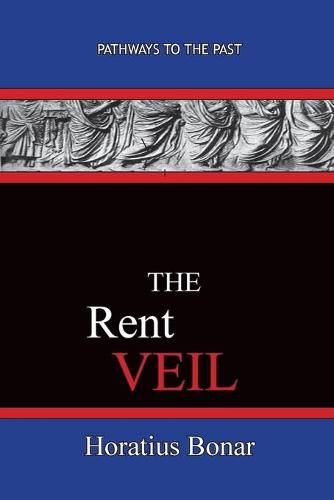Readings Newsletter
Become a Readings Member to make your shopping experience even easier.
Sign in or sign up for free!
You’re not far away from qualifying for FREE standard shipping within Australia
You’ve qualified for FREE standard shipping within Australia
The cart is loading…






This title is printed to order. This book may have been self-published. If so, we cannot guarantee the quality of the content. In the main most books will have gone through the editing process however some may not. We therefore suggest that you be aware of this before ordering this book. If in doubt check either the author or publisher’s details as we are unable to accept any returns unless they are faulty. Please contact us if you have any questions.
Published in 1875, Rent Veil was written by Scottish theologian and poet Horatius Bonar. Bonar’s Rent Veil treats a variety of topics, most directly the atonement.
The title refers to Christ and Christ’s body. Bonar claims that without the broken ( rent ) body of Christ, there would still be a barrier ( veil ) between us and God. With Christ’s death, there is the possibility of the forgiveness of sins.
In Bonar’s interesting treatment of the atonement, he also makes some intriguing points regarding the relationship of the Old Testament to the New Testament. Throughout, Bonar supports his points with liberal quotations from Scripture. The final third of his book provides an instructive call for believers. In it, Bonar extols believers to, and describes for them, the kinds of people God desires–worshipers, temples, priests, and kings.
Despite being published over a hundred years ago, Bonar’s prose is surprisingly up-to-date and easy to follow. For an interesting treatment of the atonement, one can do no better than Bonar’s Rent Veil.
Horatius Bonar was born at Old Broughton, Edinburgh, Scotland, whose brother was Andrew Bonar. Following his education at the University of Edinburgh, he maintained an active and powerful ministry for more than half a century pastoring churches in that area until his death. Throughout his life Bonar avoided all sensationalism and was calm, patient, sincere, solemn and a steady writer. His tracts and books are well-received and well-read in all Christian circles. He wrote well over 600 hymns of which more than 100 are still in use. Bonar has been described as the prince of Scottish hymn-writers.
$9.00 standard shipping within Australia
FREE standard shipping within Australia for orders over $100.00
Express & International shipping calculated at checkout
This title is printed to order. This book may have been self-published. If so, we cannot guarantee the quality of the content. In the main most books will have gone through the editing process however some may not. We therefore suggest that you be aware of this before ordering this book. If in doubt check either the author or publisher’s details as we are unable to accept any returns unless they are faulty. Please contact us if you have any questions.
Published in 1875, Rent Veil was written by Scottish theologian and poet Horatius Bonar. Bonar’s Rent Veil treats a variety of topics, most directly the atonement.
The title refers to Christ and Christ’s body. Bonar claims that without the broken ( rent ) body of Christ, there would still be a barrier ( veil ) between us and God. With Christ’s death, there is the possibility of the forgiveness of sins.
In Bonar’s interesting treatment of the atonement, he also makes some intriguing points regarding the relationship of the Old Testament to the New Testament. Throughout, Bonar supports his points with liberal quotations from Scripture. The final third of his book provides an instructive call for believers. In it, Bonar extols believers to, and describes for them, the kinds of people God desires–worshipers, temples, priests, and kings.
Despite being published over a hundred years ago, Bonar’s prose is surprisingly up-to-date and easy to follow. For an interesting treatment of the atonement, one can do no better than Bonar’s Rent Veil.
Horatius Bonar was born at Old Broughton, Edinburgh, Scotland, whose brother was Andrew Bonar. Following his education at the University of Edinburgh, he maintained an active and powerful ministry for more than half a century pastoring churches in that area until his death. Throughout his life Bonar avoided all sensationalism and was calm, patient, sincere, solemn and a steady writer. His tracts and books are well-received and well-read in all Christian circles. He wrote well over 600 hymns of which more than 100 are still in use. Bonar has been described as the prince of Scottish hymn-writers.